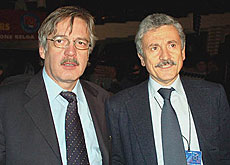New senator will take Swiss values to Rome

Claudio Micheloni, who has lived in Switzerland for more than 45 years, has been elected to the Senate in Italy's parliamentary election, which was won by Romano Prodi.
The centre-left coalition narrowly won the election, with the Italian diaspora playing a decisive role in defeating Prime Minister Silvio Berlusconi’s Casa delle libertà list.
For the first time, Italians abroad could not only vote in home elections without having to travel to Italy, they could also stand for election themselves.
Given the tight result, the six seats reserved in the Senate for emigrants were the tie-breaker in deciding who would be the victor.
Micheloni, well known for his work in promoting rights for Italians abroad in Europe, is one of those senators.
swissinfo: L’Unione has claimed victory in the elections, but the result was very close. How did you cope with the long wait for the results?
Claudio Micheloni: With trepidation. Nobody expected a result like this. It promised to be a rather even result, but not to this extent. It has become clear from the ballot that the country is split in two. The new government will therefore be confronted with the difficult task of trying to build unity in Italy.
swissinfo: Politically, the vote of the Italians abroad has played a key role, especially for the seats in the Senate. Are you satisfied with the importance emigrants have had in the elections?
C.M.: No, I don’t see it as grounds for pride but rather for concern. It’s a glaring demonstration of the division which reigns in the country. For us emigrants, political responsibility has turned out to be more important than we thought.
swissinfo: How happy are you with voter participation abroad and in particular in Switzerland?
C.M.: As regards Switzerland, where more than one in two Italians exercised their right to vote, I am extremely satisfied. On an international level, bearing in mind the difficulties attached to organising a vote of this importance, the registered voter participation [42 per cent] is very positive.
swissinfo: How is the election of expatriate parliamentarians likely to change the relations between Italy and it emigrants?
C.M.: This vote has been very important for Italians abroad and a turning point in relations with their country of origin because they have finally been allowed to exercise their rights in an effective way.
But their presence is also important for Italy itself. They will be able to make a notable contribution to the country thanks to their different way of approaching politics.
swissinfo: How will you use your Swiss cultural background during your time in parliament?
C.M.: My Swiss cultural baggage will be expressed in various ways – for example, respecting the rights of minorities and [promoting] the integration of foreigners.
And I will take the Swiss approach by striving for consensus and to talk about problems in a pragmatic rather than ideological way, in the interests of the community.
swissinfo-interview: Anna Passera
Claudio Micheloni was born in Campli in the province of Teramo (Abruzzo) in 1952. His family emigrated to Switzerland in 1960.
He was a civil engineer specialising in design, before leaving in 1998 to dedicate himself to his social and political commitments.
He has been active in several Italians abroad organisations in Switzerland. In 2002 he became general secretary of the Forum for the Integration of Migrants.
Micheloni also sits on several Italian commissions and directorates dealing with the Italians abroad.
Beside Micheloni, at least another two “Swiss” will be heading to Rome.
3.5 million Italians living abroad were eligible to vote (374,680 in Switzerland).
For the first time, they were able to elect six senators and 12 representatives.
In Switzerland, just over half of those with voting rights cast a ballot.
Senate result: 159 seats for the L’Unione, 156 for the Casa delle libertà (centre-right).
Representatives: 340 for the L’Unione, 277 for the Casa delle libertà.

In compliance with the JTI standards
More: SWI swissinfo.ch certified by the Journalism Trust Initiative










You can find an overview of ongoing debates with our journalists here . Please join us!
If you want to start a conversation about a topic raised in this article or want to report factual errors, email us at english@swissinfo.ch.